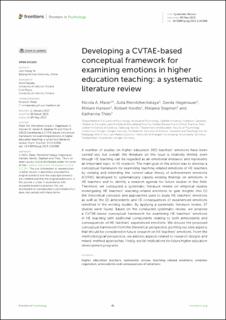| dc.contributor.author | Maier, Nichola A. | |
| dc.contributor.author | Mendzheritskaya, Julia | |
| dc.contributor.author | Hagenauer, Gerda | |
| dc.contributor.author | Hansen, Miriam | |
| dc.contributor.author | Kordts, Robert | |
| dc.contributor.author | Stephan, Melanie | |
| dc.contributor.author | Thies, Katharina | |
| dc.date.accessioned | 2024-02-16T13:25:50Z | |
| dc.date.available | 2024-02-16T13:25:50Z | |
| dc.date.created | 2023-05-29T16:20:13Z | |
| dc.date.issued | 2023 | |
| dc.identifier.issn | 1664-1078 | |
| dc.identifier.uri | https://hdl.handle.net/11250/3118185 | |
| dc.description.abstract | A number of studies on higher education (HE) teachers' emotions have been carried out, but overall, the literature on this issue is relatively limited, even though HE teaching can be regarded as an emotional endeavor and represents an important topic in HE research. The main goal of this article was to develop a conceptual framework for examining teaching-related emotions of HE teachers by revising and extending the control-value theory of achievement emotions (CVTAE) developed to systematically classify existing findings on emotions in HE teachers and to identify a research agenda for future studies in this field. Therefore, we conducted a systematic literature review on empirical studies investigating HE teachers' teaching-related emotions to gain insights into (1) the theoretical concepts and approaches used to study HE teachers' emotions as well as the (2) antecedents and (3) consequences of experienced emotions identified in the existing studies. By applying a systematic literature review, 37 studies were found. Based on the conducted systematic review, we propose a CVTAE-based conceptual framework for examining HE teachers' emotions in HE teaching with additional components relating to both antecedents and consequences of HE teachers' experienced emotions. We discuss the proposed conceptual framework from the theoretical perspective, pointing out new aspects that should be considered in future research on HE teachers' emotions. From the methodological perspective, we address aspects related to research designs and mixed-method approaches. Finally, we list implications for future higher education development programs. | en_US |
| dc.language.iso | eng | en_US |
| dc.publisher | Frontiers | en_US |
| dc.rights | Navngivelse 4.0 Internasjonal | * |
| dc.rights.uri | http://creativecommons.org/licenses/by/4.0/deed.no | * |
| dc.title | Developing a CVTAE-based conceptual framework for examining emotions in higher education teaching: a systematic literature review | en_US |
| dc.type | Journal article | en_US |
| dc.type | Peer reviewed | en_US |
| dc.description.version | publishedVersion | en_US |
| dc.rights.holder | Copyright 2023 The Author(s) | en_US |
| dc.source.articlenumber | 1142506 | en_US |
| cristin.ispublished | true | |
| cristin.fulltext | original | |
| cristin.qualitycode | 1 | |
| dc.identifier.doi | 10.3389/fpsyg.2023.1142506 | |
| dc.identifier.cristin | 2149941 | |
| dc.source.journal | Frontiers in Psychology | en_US |
| dc.identifier.citation | Frontiers in Psychology. 2023, 14, 1142506. | en_US |
| dc.source.volume | 14 | en_US |

